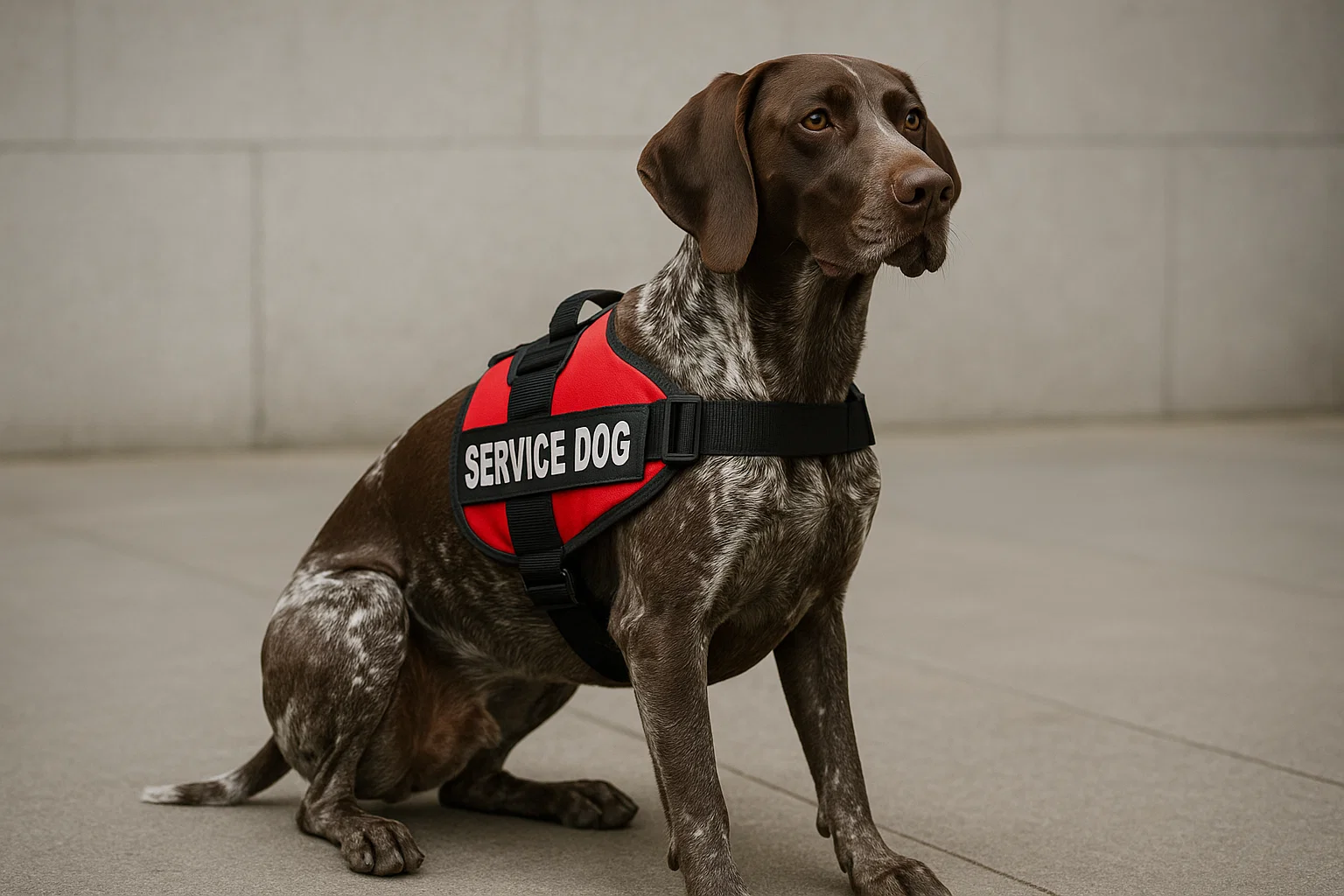German Shorthaired Pointer as a Service Dog

The German Shorthaired Pointer (GSP) is a versatile dog breed that has gained recognition for its athleticism, intelligence, and enthusiastic personality. Originally bred for hunting, this breed has evolved into a beloved family companion, and its traits are increasingly being considered for service work. However, whether they genuinely fit the mold of an ideal service dog needs thoughtful assessment.
German Shorthaired Pointer Overview
Before delving into their suitability for service work, it is essential to understand the core characteristics of the German Shorthaired Pointer. This breed's history as a hunting dog deeply influences its physical and behavioral traits, contributing to its potential as a service dog.
Physical Characteristics
The German Shorthaired Pointer is a medium to large-sized dog, renowned for its distinctive appearance and strong build. They typically weigh between 45 to 70 pounds and stand roughly 21 to 25 inches tall at the shoulder, making them suitable for service roles that require physicality. This breed is characterized by:
- Muscular build: Their well-defined musculature provides the strength necessary for mobility assistance and search and rescue operations.
- Short, dense coat: Their coat is water-resistant, making them well-suited for outdoor activities and environments; however, this also means they are not as well-suited for cold climates without protection.
- Energetic posture and keen expression: Their lively nature is evident in their bright, alert eyes and eager stance, always ready for the next activity or challenge.
The physical attributes of GSPs render them appropriate for certain service dog roles, especially those involving physical exertion and active tasks.
Temperament and Attitude
The temperament of the German Shorthaired Pointer is one of its most defining features. They are often described as:
- Intelligent and quick learners: This breed scores high in terms of trainability and can pick up new commands swiftly, which is crucial for service work.
- Affectionate and people-oriented: GSPs are known for their loyalty and strong bond with their handlers, making them reliable companions.
- Energetic and enthusiastic: Their high energy levels require appropriate channels to prevent behavioral issues like hyperactivity, but it also makes them ideal for active roles.
- Alert and vigilant: These dogs are naturally watchful, which can be advantageous in scenarios requiring awareness of the environment, such as medical alert services.
In stressful environments, their temperament remains stable when properly trained, but this does require consistent and continuous training regimens to ensure their energy and instincts are effectively managed.
Types of Service Work
The suitability of German Shorthaired Pointers for different types of service work varies based on the specific tasks involved and their natural instincts. They shine in roles that leverage their energy, intelligence, and physicality:
- Mobility Assistance: Their size and strength suit tasks requiring physical support to handlers with mobility impairments, such as retrieving items or providing stability.
- Search and Rescue: With their keen sense of smell and tireless work ethic, they can excel in search and rescue operations.
- Medical Alert: GSPs can be trained to detect certain medical conditions such as diabetic alerts due to their sharp olfactory senses.
- Psychiatric Support: While their high energy can be a challenge, with the right training, they can offer emotional comfort and alertness support in psychiatric service roles.
Roles unsuited for GSPs might include those requiring extended periods of stillness or where calm demeanor is crucial, such as therapy work for people with fears or aversions to active dogs.
Health Considerations
Although GSPs are robust and generally healthy dogs, aware handlers must note breed-specific health issues which could impact service work capabilities:
- Hip Dysplasia: This common ailment in larger breeds can limit their effectiveness in physically demanding service roles.
- Bloat (Gastric Torsion): This life-threatening condition can occur in deep-chested breeds and requires quick medical intervention, affecting their reliability in urgent response roles.
- Exercise-Induced Collapse: Potential susceptibility to overexertion requires awareness and monitoring, which could limit extended service activities.
Despite these concerns, regular veterinary care and a well-planned regimen can mitigate health risks, allowing the GSP to fulfill its role effectively.
Training and Suitability
German Shorthaired Pointers possess qualities that are desirable for training, yet there are important considerations to account for:
- High Trainability: Their intelligence and eagerness to please facilitate positive training outcomes using reward-based methods.
- Consistency is Key: Due to their energetic nature, consistent training sessions are essential, along with adequate exercise to prevent restlessness.
- Behavioral Management: It is crucial to address their strong prey drive and exuberance from an early age through training, ensuring public appropriateness and obedience.
The combination of their aptitude for learning and the need for adequate management means that while training can be rewarding, it demands commitment and involvement from the handler.
Summary of German Shorthaired Pointer
In summary, the German Shorthaired Pointer has numerous attributes making it a strong candidate for service roles, alongside some challenges:
Strengths:
- Intelligent and quick learners
- Strong and capable of physical tasks
- Energetic and enthusiastic
Weaknesses:
- Requires significant exercise and training management
- Potential health issues like hip dysplasia and bloat
- High prey drive needing management
Ideal Service Roles:
- Mobility Assistance
- Search and Rescue
- Medical Alert Services
The GSP's suitability depends significantly on the handler's ability to channel its traits positively. When these are successfully managed, the GSP can be an invaluable partner in various service capacities, offering both practical support and affectionate companionship.











